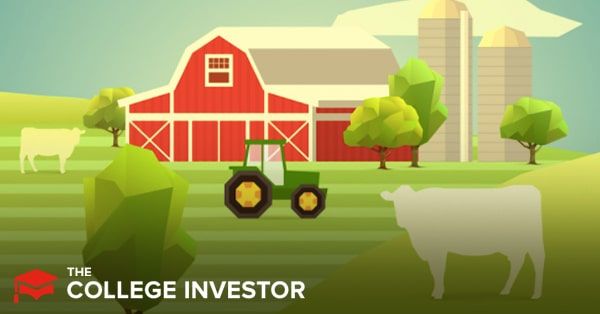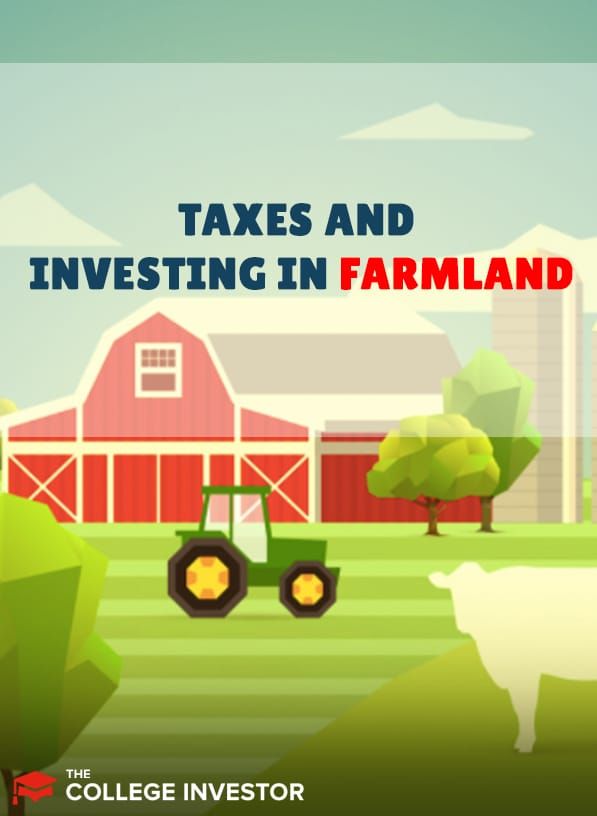
Farmland investing provides a unique way for investors to gain exposure to agriculture and real estate at the same time. And it’s an asset that’s relatively uncorrelated to the stock market.
Those are two advantages that can make farmland investing attractive. However, farmland investors must understand the unique investment at tax time.
If you own farmland, or you sold farmland in the last year, here’s what you need to know about farmland investing taxes.
Curious about investing in farmland? Check out AcreTrader here >>
Types Of Farmland Investing Taxes
Farmland investors typically pay income taxes on rental income earned from the farm and capital gains taxes when they sell the farm for a profit. Below, we break down how both types of farmland investing taxes work.
Rental Income
Rental income received from the farm is taxed as "unearned income." Investors pay income tax on the net income from the farm, but they don’t need to pay Social Security and Medicare taxes.
Net income includes all rental income less legitimate expenses. Farmland investors may receive distributions greater or less than the net income. But the taxes they pay are based on income.
In the past, most farmland investors owned land directly, but that is starting to change. Companies like AcreTrader are making it easier for smaller investors to invest in farmland. These companies typically use the partnership model to structure deals. If an investor uses a partnership or corporation to invest, the net income from the company is what's taxed.
Capital Gains
When farm investors sell farmland (or shares of a farm investment company), they will pay capital gains taxes. If they’ve owned the farm for less than a year, any gains are subject to short-term capital gains rates. Investors who have held farmland for more than a year will pay the lower long-term capital gains tax rates.
Farmland Investing Tax Forms
The tax forms that farmland investors need to file depend on their investment activities and how their investment is structured.
Direct farm owners may fill out IRS Form 4835. This form details income and expenses associated with farmland ownership. Once the form is complete, the information can be transferred to Schedule E. Schedule E is the part of a tax return that reports passive income such as rents or royalties.
Investors who own farmland through a pass-through corporation or a company will not have to fill out IRS Form 4835. Instead, they will receive a Form K-1 from the company. This form can be used to fill out schedule E on the tax returns. A K-1 is a form that reports income cost-basis in a deal, along with income and losses.
When an investor sells farmland (or shares in a farmland investment), the final profits will be reported on Schedule D. Direct farmland owners must be responsible for tracking their cost basis and profits on their own. Investors who use the partnership structure can typically use the K-1 form to report their cost basis and final profits.
AcreTrader Tax Forms
Based on our AcreTrader experience, you'll receive your K-1 from AcreTrader in late February or early-March for most investments.
Filing Farmland Investing Taxes In Multiple States
Farmland investors always need to file state tax returns in the state where the farm is located. This can be done through composite tax returns or individual state returns.
Composite Tax Returns
Most states allow a pass-through entity (like a farm investment company) to file a composite return on behalf of its nonresident individual owners. This return replaces the need for individuals to file in those states.
When a farm investment company files a composite return on behalf of its investors, individuals don’t need to file a second return on their own. The state where the farm is located receives tax money when out-of-state investors pay income tax in their state.
The composite tax return is the easiest way for investors to file taxes. But some states don’t allow it.
Individual State Returns
With an individual state return, an investor must file their entire tax return in the state where their farm is located and the state where they live. They will be charged an income tax in proportion to the amount of income earned in that state. Filing state tax in two states does not result in paying double state taxes.
A person who earns $5,000 in farm investment income in Nebraska, and $95,000 in wage income in Minnesota will need to file returns in both states. Nebraska will charge income tax based on $5,000 in income. Minnesota will charge income tax based on $95,000 of income. Most tax software makes it easy to file multiple state returns as long as you accurately enter the information.
Can I Claim Depreciation On Farmland?
Depreciation is used to allocate the cost of an investment over the asset’s useful life. But, unlike most real estate investments, farmland is considered to have an indefinite useful life. So it doesn’t typically qualify for depreciation.
However, there are exceptions to this rule. Fruit and vine crops have a limited production lifecycle. Therefore, land with these crops includes “deductible improvements”. Additionally, structures such as barns, irrigation equipment, or other improvements are subject to wear and tear. These assets can be deducted.
Other legitimate expenses can also be deducted. For example, farmland investors who own physical land may have to pay for seeds, labor, and equipment rentals (to name a few expenses).
Passive farmland investors rarely have to worry about itemizing or claiming legitimate expenses and deductions. The company managing the investment will typically report income and losses on your IRS Form K-1.
Final Thoughts
If you’ve invested in farmland through a company like AcreTrader, filing taxes should be relatively easy. By March 15th, the company should send you a Form K-1. It should also let you know whether you need to file a tax return in multiple states or just in your state of residence.
You can then enter the information from your K-1 into any tax software. The software will then appropriately calculate your tax burden based on the information in the return.
Filing taxes in multiple states tends to cost extra. However, it's not difficult to do using tax software like H&R Block or TurboTax. Simply following the workflow for multiple states allows users to accurately file.

Robert Farrington is America’s Millennial Money Expert® and America’s Student Loan Debt Expert™, and the founder of The College Investor, a personal finance site dedicated to helping millennials escape student loan debt to start investing and building wealth for the future. You can learn more about him on the About Page or on his personal site RobertFarrington.com.
He regularly writes about investing, student loan debt, and general personal finance topics geared toward anyone wanting to earn more, get out of debt, and start building wealth for the future.
He has been quoted in major publications, including the New York Times, Wall Street Journal, Washington Post, ABC, NBC, Today, and more. He is also a regular contributor to Forbes.
Editor: Clint Proctor Reviewed by: Ashley Barnett
